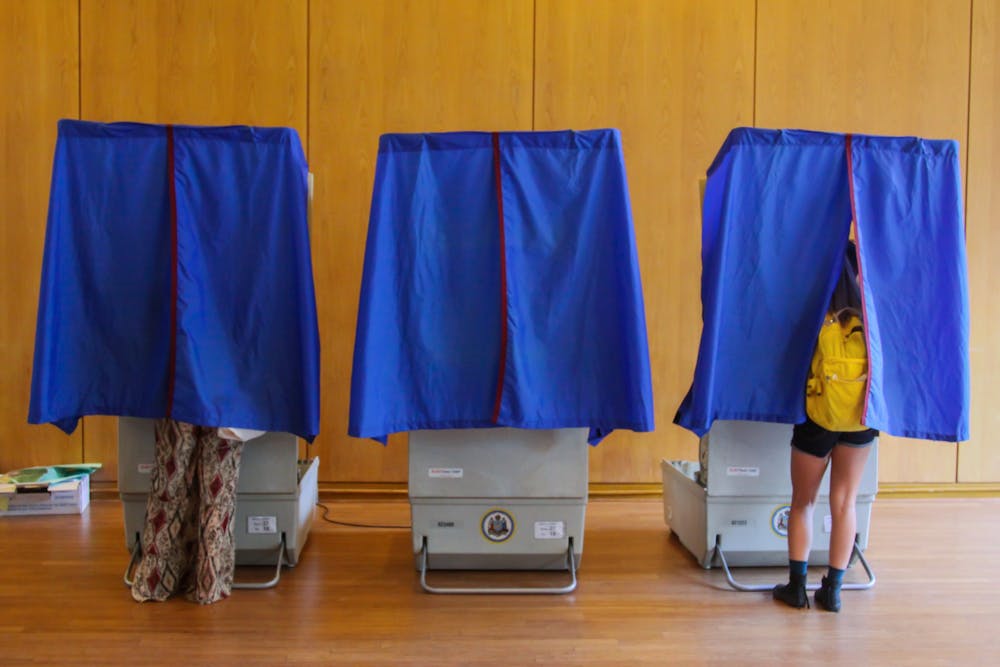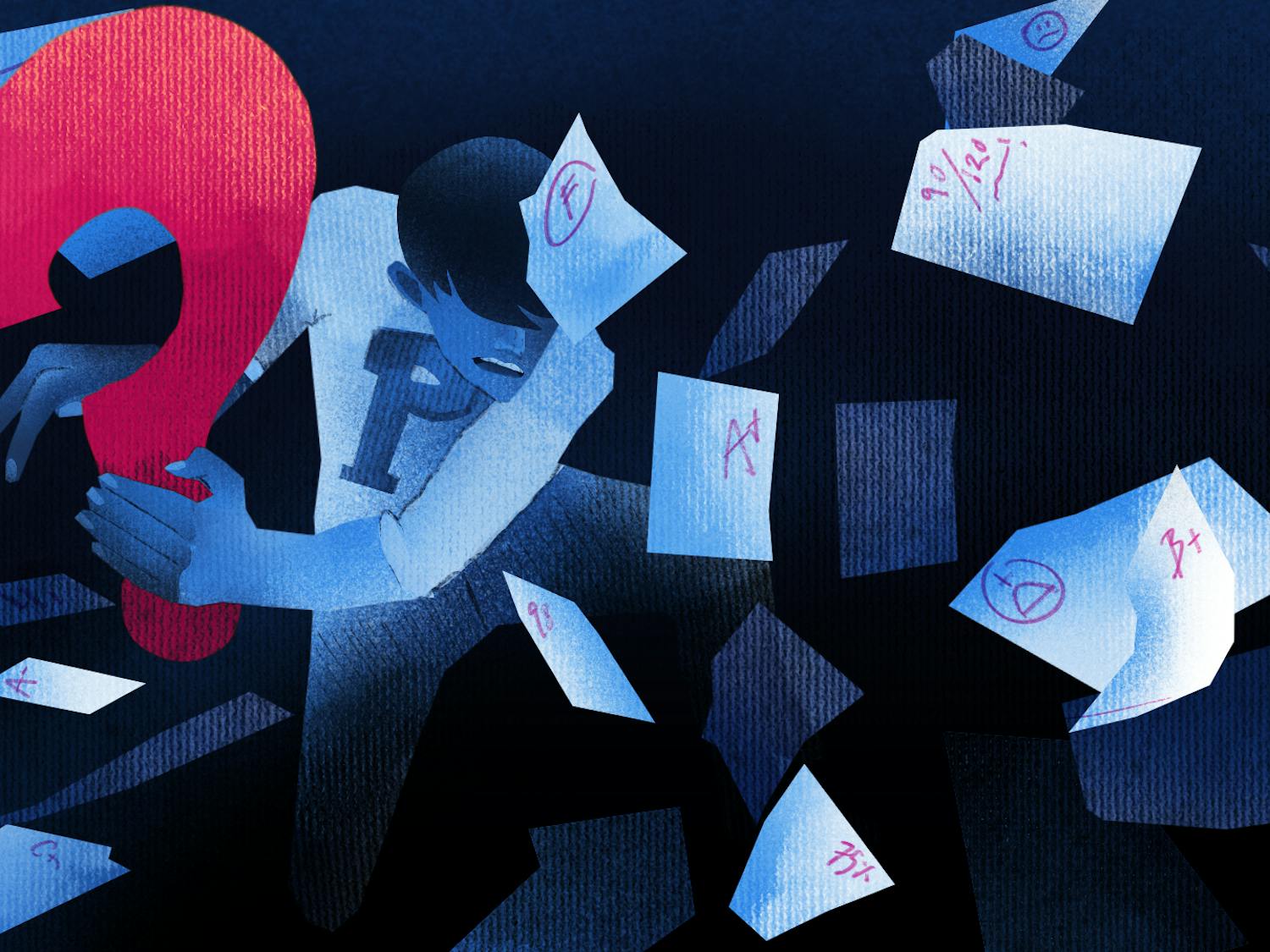In 2018, when the Eagles won the Super Bowl, Penn decided to suspend operations for the parade. In 2017, 2018, and 2019, Penn canceled classes for snow days.
Yet, in this pivotal election year, Penn will not suspend operations for Election Day.
Understandably, Penn is bound by regulation and claims it cannot compress the school year any further. However, other than poll workers, Penn is not offering non-academic staff even partial paid time off to participate in our democracy, in the most important city in this election’s most important state.
Penn will not join Columbia, Brown, Stanford, Cornell, University of Chicago, Drexel, NYU, Stony Brook, George Washington University, American University, Colorado College, or Vanderbilt in either canceling classes or offering paid time off to employees.
We’re not calling upon Penn to suspend operations on Tuesday. Penn doesn’t need to shorten the academic schedule or infringe upon state regulations.
Instead, we’re asking Penn to join many of its peers in formally creating voting hours for employees, particularly non-academic employees who often do not have the economic or psychological freedom to proactively step away from work to vote.
Rather than joining peer institutions, Penn’s leadership has opted to issue ‘guidance’ to professors and supervisors to offer students and staff flexibility to vote, despite repeated requests from trustees, graduates, professors, and students to implement a formal policy that will protect their employees’ ability to vote. Penn will rely upon supervisors to interpret and relay their guidance to the University’s 41,000 employees.
41,000 employees.
That’s around 3,000 fewer than the 44,000-vote margin of victory that decided the 2016 race for president in Pennsylvania. Penn is the largest private employer in Pennsylvania’s most populous city, making these decisions uniquely consequential to American political history.
The challenge with the University’s current approach of relying on individual supervisors or professors to interpret Penn’s guidance is that it leads to mixed results. That’s unsurprising: In any large organization, guidelines are interpreted differently or simply missed.
On Monday, two Penn seniors spent 90 minutes walking around campus and talking to over 20 Penn employees — a helpful indicator of how Penn’s informal approach is playing out on the ground. While some employees had voted early or were aware of flexibility, most hadn’t voted and hadn’t heard from their supervisor about flexibility. They plan to vote in person after work on Tuesday like any other election year. If early voting conditions — long lines, broken machines, and general disorganization — are any harbinger, it's likely that these Penn employees will face extremely difficult voting circumstances and potentially be disenfranchised.
Consider these employee examples: A Facilities and Real Estate worker outside of Huntsman Hall said that he planned to vote after work on Election Day, and had not had any interaction with his supervisor to ensure flexibility on Election Day. He hadn’t considered that there would be long lines after work.
A Wharton Operations worker described how, like many of his colleagues, he lived far away from campus and planned to vote after work as he could not take sufficient time off during the day to go home. He expressed concerns that the lines would be long, but remained committed to exercising his right to vote regardless of the circumstances.
Two Facilities and Real Estate workers, one, a United States military veteran who recognizes the importance of voting, said he only gets to vote once every four years due to limited flexibility offered by Penn. He stated that he needs to use one of his limited vacation days to participate in the upcoming election. He described his plans to wake up at 6:30 a.m. on Tuesday in anticipation of long lines. In the primary earlier this year, he was unable to vote because multiple polling stations were combined into one polling station, resulting in significant chaos with traffic and long lines.
Concerned students and graduates have been told by Penn that because the University has not heard complaints, there isn't a problem. Our fear is that the problem won’t be realized until Tuesday. Then it will be too late.
On the academic side, despite guidance to professors not to schedule exams or deadlines, as of Monday, at least one exam in an undergraduate PPE class was still scheduled, making it necessary for students to individually reach out to professors requesting that the guidelines be heeded. It seems the University’s decentralized approach is falling short from multiple angles.
A University-wide policy will better protect employees from any communication challenges or inadvertently poor execution from supervisors. Furthermore, we ask that Penn direct its third-party vendors, such as Allied Security and Bon Appétit, to afford their on-campus staff the same time off offered to Penn employees.
In our everyday lives, laws and regulations, not guidelines, are created to protect our most sacred rights. Our fundamental right to vote should be protected. This conviction reflects Penn’s commitment to civic engagement — now, we call on the institution to translate its values into action.
To all students, graduates, staff members, and faculty — please join us in signing this petition urging the University to take stronger action to protect Penn employees’ right to vote.
Sign the petition here.
Co-signers (students and alums)
- Ada Yeung (C’13, 2013 Class Board)
- Adam Thompson (C’11 W’11)
- Asif Rahman (ENG ‘04)
- Alessandro Portela (C’16 W’16)
- Alexis Ziebelman (2016 Class Board)
- Alicia Yang (ENG’10, 2010 Class Board)
- Alisa Wadsworth (C’21)
- Allison Bart (C’15, 2015 Class Board)
- Amelia Galbraith (C’21)
- Andrew Brown (C’16)
- Andrew Kaplan (W’07, 2007 Class Board)
- Andrew Snyder (W’09, 2009 Class Board)
- Anisha Kamat (C’15)
- Annie Lindner (C’21)
- Ariel Colangelo (C’10, 2010 Class Board)
- Arushi Kewalramani (W’21)
- Ashley Novack (C’07)
- Asif Rahman (ENG’04)
- Audrey Harnagel (C’16)
- Avery Lawrence (C’08)
- Ben Watkins (C’13, 2013 Class Board)
- Beryl Sanders (C’13, 2013 Class Board)
- Blair Soden, (C’06)
- Brett Perlmutter (C’09, 2009 Class Board)
- Brynna Deaver Gianos (C’05, 2005 Class Board)
- Caroline Gordon Organisciak (C’05, 2005 Class Board)
- Cecilia Sun (C’12 W’12 WG’18)
- Danish Munir (W’08)
- David Levy (ENG’96 W’96)
- Deepak Prabhakar (ENG’11, 2011 Class Board)
- Dennis Yu (W’06, 2006 Class Board)
- Ellen Huynh (C’11, 2011 Class Board)
- Emma Carlson (C’21)
- Emma Harris (C’21)
- Emma Sweet (C’16, 2016 Class Board)
- Eric Morris (W’11, 2011 Class Board)
- Erin Kelly (C’21)
- Eva Zlotnicka (WH’04 ENG’04)
- Ezra Kurtz (C’17)
- Jacon Meiner, (C’15, 2015 Class Board)
- Jacob Wallenberg, Jr (W’16)
- Jake Shuster (C’13)
- Jake Stein (W’06)
- Jamie Plancher (C’15)
- Jared Katseff (C’06)
- Jeff Chudakoff (W'15, ENG'15, 2015 Class Board)
- Jibran Khan (C’12 W’12 WG’19 MUSA’19, 2012 Class Board)
- Jodi Miller, (C'14, GSE'15, 2014 Class Board)
- John Labaree (C’16)
- Jose Delgado (W’19)
- Julie Chen (W’21 ENG’21)
- Kathy Wang, (W’11, 2011 Class Board)
- Kelley Baumgartel (N’06, 2006 Class Board)
- Kelly Sessler (N’07, 2007 Class Board)
- Kasia Klasa (N’13, W’13, 2013 Class Board)
- Laura Bilder (W’13, 2013 Class Board)
- Laura Sachse (W’16)
- Laura Samotin (C’14)
- Lauren Saul (C’07 W’07)
- Lauren Titus (W’04, 2004 Class Board)
- Marco Piol (C’17 W’19)
- Matt Amalfitano (C’12)
- Matt Jayson (W’13, 2013 Class Board)
- Matt Kalmans (C’15)
- Matthew Lee Stetz (GR’16)
- Melissa Bortnick (C’06, 2006 Class Board)
- Michelle Yang (2010 Class Board)
- Neal Wadhwa (W’12, 2012 Class Board)
- Nicholas Giordano (N’15, 2015 Class Board
- Nick Bobys (C’06, 2006 Class Board)
- Nick Coetzee (C’16)
- Nico Santiago (C’22)
- Nikita Bastin (C’21)
- Nikki Moorer (C’12, 2016 Class Board)
- Omar Maskati (ENG’11)
- Patrick del Valle (W’15, 2015 Class Board)
- Paul Treichler (C’06, 2006 Class Board)
- Rebecca Carroll (N’14, 2014 Class Board)
- Rachel Bernard (2015 Class Board)
- Rachit Shukla (W’07)
- Raghav Bajaj (ENG’05 L’08)
- Reggie James (W’17)
- Riley Kennedy (C’21)
- Ross Mechanic (ENG’17)
- Salima Ghadimi (C’16)
- Samir Malik (C’08 W’08)
- Sarah Jiang (ENG’08, 2008 Class Board)
- Sarah Mehoyas (C’13 W’13)
- Sascha Samotin (C’15)
- Selina Nie (ENG’21)
- Shafqat Islam (C’03)
- Shally Venugopal (W’05)
- Shelby Scovel (C’05 MBE’07, 2005 Class Board)
- Simon Kirk (C’06)
- Simran Chand (C’21)
- Srikar Reddy (W’15, C’15, 2015 Class Board)
- Taivon Brown (2004 Class Board)
- Tamara Yang (N’11, 2011 Class Board)
- Visalakshi R. Venugopal (W’05)
- Will Fry (C’17 W’17)
- Yiyi Zhou (ENG’11, 2011 Class Board)
- Zeke Sexauer (C’13, 2013 Class Board)









